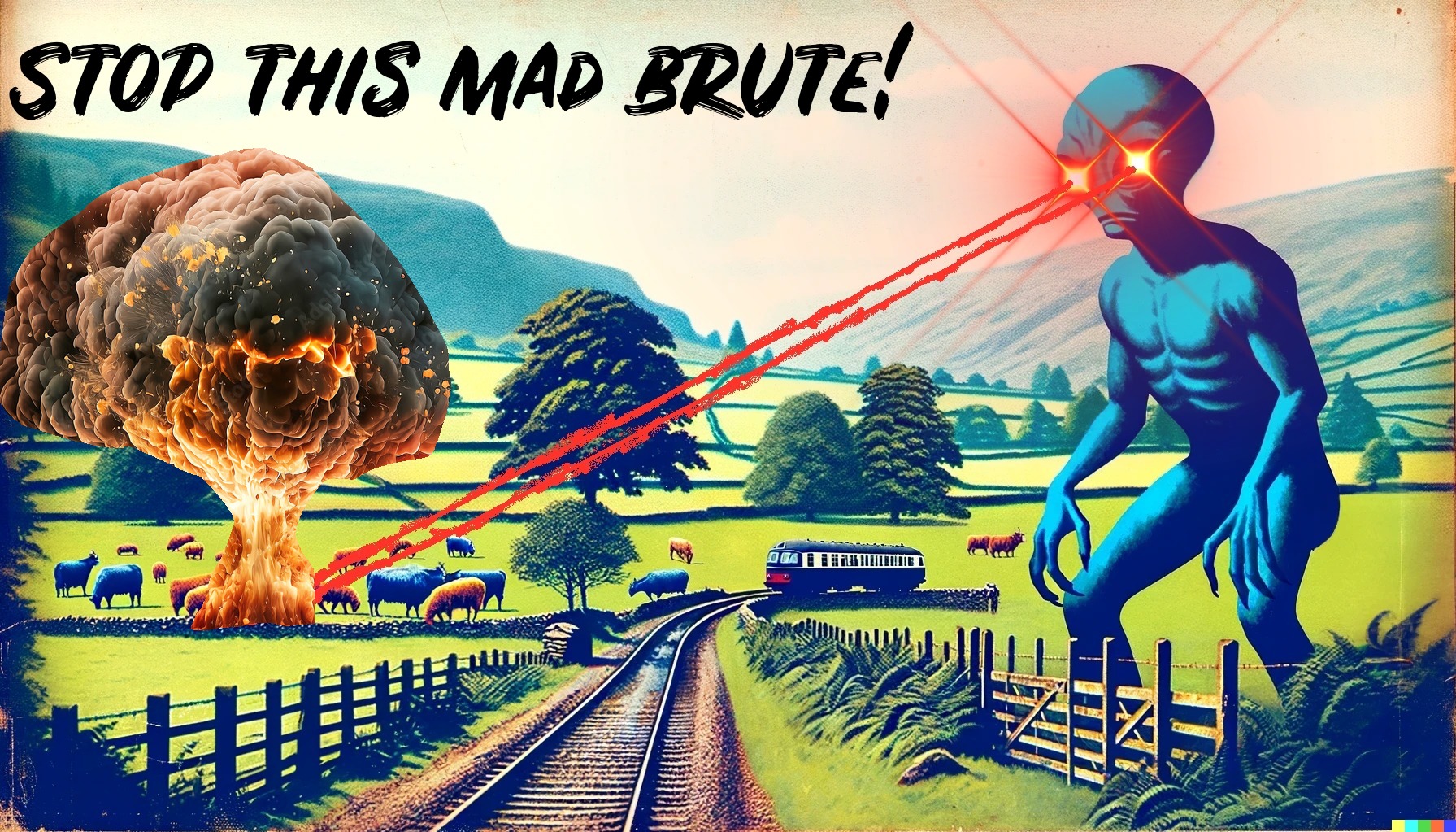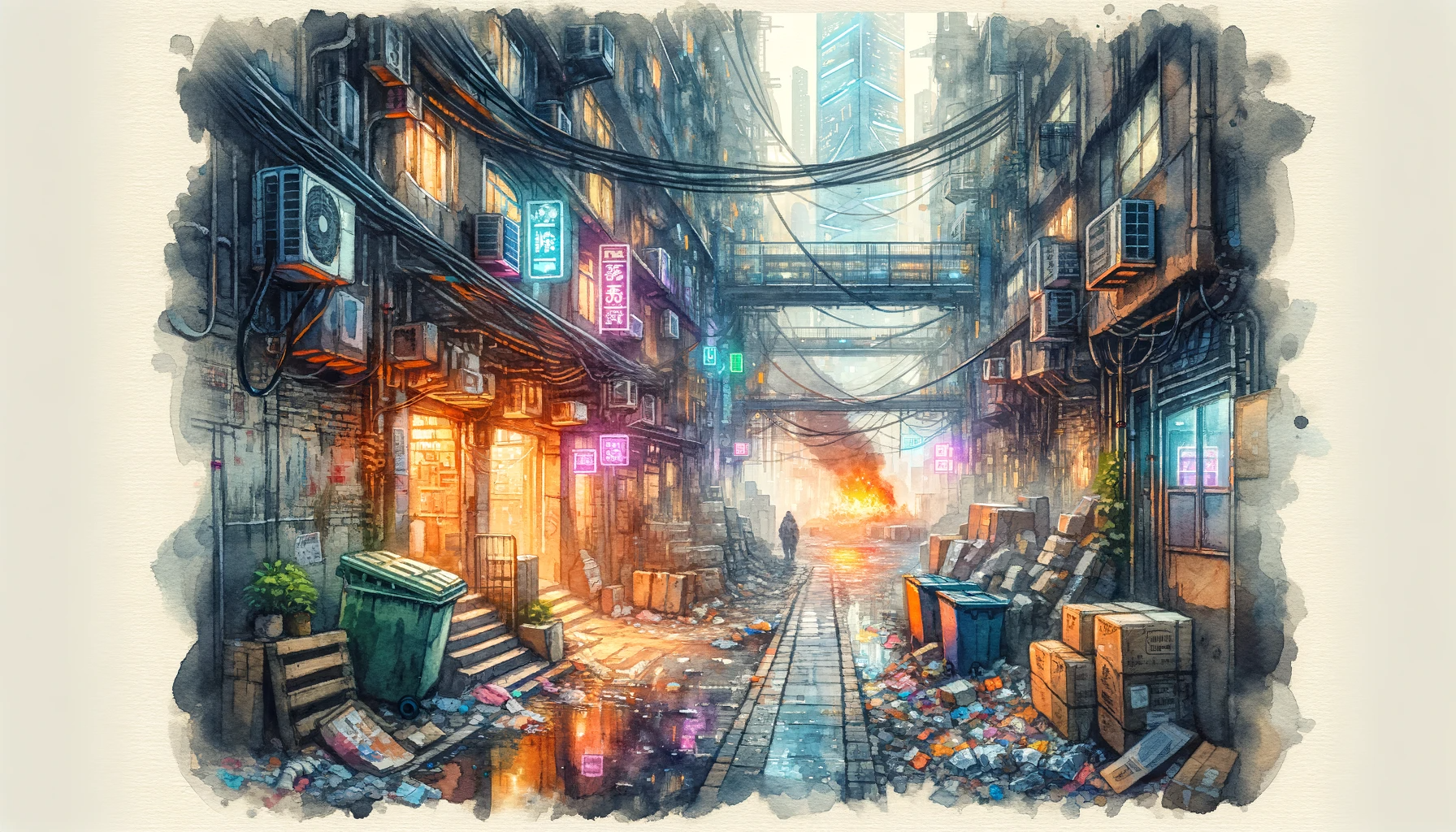Kilobo Lore!
The Tau were not the first xenos species the people of Kilobo had encountered, but they were the first to raise a serious challenge to their way of life. Some time ago an ork war band had raided Anagh. The defenders had been easily swept aside… so easily, in fact, that combined with the fact that greenskins had little use or appreciation for the artisan electrical goods stored on the station, most of the orks had concluded the Kilobo system was simply boring. Nothing good to fight, nothing good to loot. As such, with an exception to be discussed, these orks did not often make large scale appearances in the Kilobo system after this. However, as traumatic as this was to those who directly witnessed the event, to the system as a whole it was almost received as a positive.
For it seemed like a wonderful confirmation of the Imperial creed! Not having much contact with xenos the Xaviorite version of the faith so firmly entrenched in Kilobo had little need to stress that one must fear the xenos. But it is not as if Ikkyu had never mentioned as much, and the faithful were dimly aware that this was the sort of thing they had to do. So when the greenskins had raided, and stories and pict feeds came back of their pitiless savagery and terrifying brutality, it seemed as if it was a demonstration from the Emperor Himself that even the minor aspects of the faith are to be held dear and reverent. Just as the Church taught - the xenos was out there, the xenos was terrifying, and we must trust in the Emperor and His Imperium to protect us from them. So far so good.
The arrival of Tau diplomats and traders, therefore, came as something of a shock. Refined, willing to converse in Gothic, happy to engage in mutually beneficial trade; this was nothing like what they had been taught, and for a while it seemed Kilobo’s usually fairly harmonious democratic system would split. For normally the system worked (so it was understood by participants) on a sort of miniature scale version of Imperial governance. As long as each subunit paid its tithe and remained loyal to the Emperor and His Faith, they could largely do what they want so long as they likewise left others alone. When, however, some manufactura blocks voted to welcome trade with the Tau in their districts (this was especially common in poorer parts of Kenra and Kofoglin) the more pious blocks deemed this so great a violation of the Imperial creed as to merit central intervention. On the other hand, those engaged in the trade relations (and even some moderates who had foresworn as much but did not want civil war over the matter) doubted whether the apparently beneficent Tau could really be what the Church had had in mind by the xenos to be feared. Indeed their philosophy of the greater good was not so dissimilar from Conghaile-Asantewaa thought; a fact Water Caste diplomats were keen to stress. Debate went on and tensions rose, the Kilobo system approached civil war.
Meanwhile behind closed doors on Tramale there was near panic. Upper echelons of the government were well aware that they had a relatively sweet tithing deal from the Imperium because of their favoured relationship with powerful Ecclesiarchs. And there was only so much their patrons could tolerate, or provide cover for, when it came to dealings with xenos. And even if the Imperium was not at war with the Tau yet technically, a xenos was a xenos and the frank sympathy for their teachings and suggestions they might be combined with faith in the Emperor were horrifying to churchmen and risked causing scandal if it came to be seen as the official position of, or even tolerated by, the Kiloboan government. They had little chance of keeping dalliance with the Tau under wraps either, as the watchful Mechanicus were keen to spread news of anything that would undermine the standing of Kilobo’s regime. Not wanting to enter into open civil war, but even less wanting to bring down the wrath of the Imperium and lose their favoured tithing status, Kilobo’s elite pulled every string they could to seek potentially discrediting information on the Tau. They got lucky.

Unbeknownst to them, Kilobo was far from the only system at risk of infestation from the Tau. Far away the third sphere of expansion had reached out beyond the Damocles gulf some time ago and had been converting once loyal worlds to Xenos rule. In fact as far as the Administratum was concerned the fact that they were still paying their tithes and professing loyalty to the Emperor marked Kilobo out as relatively secure compared to others in a similar position, considering that some worlds had already engaged in vile treachery and switched allegiance to the xenos filth. As such the Damocles crusade was being prepared for; part of which was intelligence gathering on the Tau, their military and economic capacities, and incidentally therefore the social structure which supported those capacities. And in the course of these investigations some hazy ideas about the role of the Etherials in Tau society had been discovered. Once this was relayed back to Kilobo’s government they knew how to win the propaganda war.
Via subtle means, without appearing to intervene themselves, they had their agents encourage people in Tau friendly manufactora blocks to casually inquire about the role of the Ethereals. Those Tau who had established themselves saw no reason to be coy, and spoke of the wondrous leadership this preternaturally gifted leadership caste provided, always somehow managing to carry the day through their sheer force of personality, the reverent awe one feels in their presence, and how their eminent reasonableness simply commands assent. This, of course, was the absolute worst way of selling the people of the Kilobo system, who instantly (thought they) recognised in this the dread hand of a psychic aristocracy and its suppressive aura! In fact this is somewhat of a simplification of the means by which the Ethereals compel assent but for the sakes of propaganda such subtleties didn’t matter. As word spread — aided again by agents of the central government — of this vile sorcery, even those manufactora most enmeshed in Tau trading relations rapidly withdrew their support. Soon after word spread Tau diplomats had been expelled and (legal) trade halted.
Across the system churchbells were wrung, preachers praised the people for making the right choice while at the same time issuing calls for repentance for the fact that it had come so close to going the wrong way. Once again, however, the Imperial creed had been vindicated — even when apparently here in peace, the xenos was not to be trusted. Kilobo’s leadership sighed in relief, as backchannel communications made it clear that the position of their patrons in the Church had been strengthened by Kiloboians’ willingness to en masse “autonomously” expel the xenos even while other systems gave themselves over to treachery. Faith prevails! None the less, a commission of inquiry was launched re why people on Kenra and Kofoglin especially had come so close to ruin.
What this found was that Kenra and Kofoglin face unique social challenges not adequately addressed since the fall of the old regime. In Kofoglin’s case the problem was simple — the fauna of their world was incredibly dangerous, yet their main industries involved venturing into the forest for timber and thus exposure to these wild beasts. During the bad old days of the ancient regime they had simply died en masse, psychically compelled to continue working even as vicious sauropods devoured their fellows scant meters away from them. Since freedom they had been able to fortify their towns, initiate security procedures for lumberjack teams, and so on — but while all this was a massive improvement, in the end their work was still intensive and difficult. The Tau, offering advanced weapons technology for defence of workers and fortified habitations, and drone technology for automated long distance working thus removing risk entirely, had seemed to offer solutions to problems that the Tramale administration simply had nothing to say about.
Kenra’s problem was different, and easily stated. A culture religiously committed to plain living, moderate expenditure, and idealising vows of poverty and community service, had very little use for a pleasure planet. The system was a bit too backwater to attract elites from other parts of the Imperium, and in its dour philosophy had little use for the main resources - its own beauty - Kenra had to offer. The Tau on the other hand seemed to combine a communalistic “greater good” philosophy with an appreciation of material comforts. As such they offered not just economic opportunity but a sense of purpose and worth which Kilobo presently denied the people of Kenra.

While neither of these points had been enough to overcome the revulsion of a psychic aristocracy, they had certainly made treachery more likely for a few dangerous moments. At first a simple minded solution presented itself. Turn the resources of Kenra over to producing weapons and defensive gear for the people of Kofoglin. The occupation of Kurow Dunwɔtwe was growing more fraught by the day so extra military industrial capacity was welcome on independent grounds in any case. These ideas were implemented and to this day the system maintains a reasonably high ability to produce its own good quality weaponry. However, this solution was only a partial stop-gap for both worlds. Ironically, given the efficient production methods that made Kilobo special, this simply did not supply enough work to meet the needs of even the sparsely populated Kenra. And while better weapons and gear were nice and all for the people of Kofoglin, and made them feel the government was at least trying, in the end their lives still involved nontrivial chance of dinosaur attack. Even if they have a rifle in their hand people still don’t like being attacked by dinosaurs.
Fortunately, however, the constant horrific warfare of the 41st millennium was to provide the solution to both these problems. All conflicts will be gone into in more detail, but the Damocles crusade, the first Tyrannic war, and more recently the Plague War for Ultramar during Era Indominus all made new demands on the Kilobo system that effectively suppressed this set of socio-economic problems. The Damocles crusade was the first time a serious tithe of Guardsman was asked of the Kilobo system, being near as they were to the Tau empire. In fact the tithe was easily met by volunteers, as many yearned for revenge against what they saw as the Tau’s attempted corruption of their faith. Even former Tau sympathising manufactora were able to recruit volunteers, essentially with the idealistic goal of liberating the Tau from their oppressive Ethereal masters. (An edict of fraternity issued by one such manufactora possessed of this delusion met with little immediate reaction beyond a condemnation from the local bishop and a dedicated educational programme as to the importance and real purpose of the Damocles crusade. But its longer term consequences were in fact to be huge.) Production was likewise increased to ensure that not only could Kilobo equip its own soldiers, but even above that maintain their standard tithe and be net contributors to the Imperium’s supply chains and overall war effort.
Once this conflict drew to a close, Kilobo’s volunteer forces were sent straight into Ultramar to fight in the Tyrannic wars. This meant that even while no new forces were levied, the productive capacities of Kenra were still deployed to a large military end, and the patriotic fervour of supporting our lads beyond the stars largely suppressed latent social contradictions that had been on the verge of causing trouble before. A significant consequence of this was that the horrific casualties suffered by civilian populations during any battle against the Tyranids meant that not just Kenra but even Kulin turned more of its industrial capacity over to producing medical equipment and supplies. This was to prove a lasting industry in the Kilobo system, and deepened both the economic ties but also bonds of goodwill between them and the people of Ultramar.
Eventually this Tyrannic war won many (not all - some, of course, going permanent and being shipped off across the galaxy) of Kilobo’s fighting volunteers found their term of service completed and were able to return home — somewhat unusually for a guardsman, being “lucky” in that these huge conflicts had broke out so close to their home system making return relatively easy. But when the Plague War broke out, and especially after Iax was lost, Kilobo’s medical mass production and the bravery of its merchant navy in being willing to run dangerous supply lines were to prove vital to Ultramar’s defence. This especially earned them a bond of friendship with the politically powerful Ultramarian Tetrachy, somewhat lessening their dependence on Eccliasarchal patrons for survival within the Imperium’s complex politics.
That then is the status quo. This series of conflicts raised the military and medical industrial productive capacities of Kilobo, and deepened diplomatic and political ties with Ultramar, to a point where full employment was no longer a serious worry. Kenra even now functions as something of a hospital planet, its beautiful scenery being judged appropriate as a place for recuperation to those who have suffered in the course of noble labours, be they military or civilian. Thus not just work but cultural acceptance and a new social role was found.
As to Kofoglin, the end of the conflict did not so neatly solve their social problems. In fact, they returned. Having fought the tyranids there was more of a supply of people with the skillset necessary for sauropod hunting. However, ironically, the last thing such people wanted to do upon decommission was to relive this traumatic experience, and now they felt entitled to better - having earned a home fit for heroes, as the propaganda picts had promised them. Their deliverance was to take the form of a much more mixed blessing.
For, in the wake of the Tyranid war, the Syndicate (to be detailed elsewhere) had been able to successfully pitch its research project. Wanting a relatively backwater sector to avoid undue scrutiny, as well as exploiting the Mechanicus’s willingness to open any crack that might gain them more influence in the region, they had managed to secure LV-426 as the place to build their facility and host the xenomorph research organisms they would be studying. This required not only a base on LV-426 but also a presence on Kofoglin, as only there was a starport of sufficient size to host warp capable vessels found. From Kofoglin researchers would shuttle to and from LV-426, with the base thereon only ever minimally staffed. Given the dangers of this research they had requested a garrison unit, and it was at this point discovered that despite the distance, somehow mysterious warp eddies linked them to Catachan, andactually made travel between Kilobo and the infamous Death World rather easy.
That was perfect for all involved. The Syndicate got a group of hardy warriors, with no reputation for intellectual brilliance (so they arrogantly believed) who would be their muscle. Despite the dangers of Kofolgin to the populace, relative to Catachan it was an idyllic paradise, so it was easy to sell this garrison duty as a sort of working rest and relaxation downtime between difficult deployments for Guardsmen approaching the end of their tours of duty. And while the people of Kofoglin (and the Tramale government more generally) were initially resentful of the project, their relationship with the people of Catachan was to prove mutually beneficial.

Catachans can be a tad condescending.
Somehow the population generally
find it in their hearts to forgive them.
As shall be seen, one’s security being founded on having received the research activities of the Syndicate was at least a mixed blessing; closer in fact to a curse. For through them Slaanesh’s tendrils were to be thoroughly enmeshed in researchers on LV-426, and once established there Kurow Dunwɔtwe was soon to be visited too. But there was no way for the people of Kofoglin (or Kilobo more broadly, or their Catachan garrison for that matter) to know of this, and it seemed to them a happy arrangement that even went someway to smoothing over relations with the Mechanicus.
The final significant event shaping the present status of the Kilobo system is a repercussion of the edict of fraternity issued by some foolish manufactura block headmen. Many years later a dissident Tau (Fio’El’Bork’an’Ko’vash’An’yang - Literally “Earth Caste Engineer From Bork’an Who Strives After Heavenly Peace”; “Ko” for short) followed up on the edict. In particular, Ko was a sympathiser of the Farsight Enclaves living within a southern sept of the Tau empire. He represented a group who believed Commander Farsight’s path embodied the true spirit of the Greater Good. They thus wished to have some means of covertly smuggling goods, weapons, and intelligence, out of the Tau empire and to the Farsight enclaves. The direct path would require traversing the entire empire and thus incurred too great a risk of detection. A long path around the Empire was technically feasible, but required a staging ground where the logistics could be handled and supplies stored - and preferably one far from Ethereal control. Having learned of this edict when studying the history of the region and its conflicts, it was Ko’s gambit that the sympathetic people of Kilobo would assist in this.
Via various conduits of rogue traders this proposal was eventually put to the government on Tramale. It prompted some theological debate — does aiding one group of xenos amount to blasphemy if it is for the explicit end of sowing division and disunity among the xenos more broadly? They could come to no agreement, and eventually theological aid was sought from Ultramar in how to address the problem. The Tetrachy (allegedly the issue reached the ears of Guilliman himself, or so one hears whispered in corridors of power) could not care less for the theological elements of the debate. But they appreciated the chance to weaken this upstart empire on their boarders. They hence replied that the Emperor was a warrior but a thinker too, and He always favours using the best means possible to lay low xenos. Actually using one of their own as an instrument of their destruction was surely the sort of irony He’d appreciate. With this advice in hand (and, one might cynically note, written assurance of their complicity from their extremely powerful neighbours) the government in Tramale sent word back to the dissident Tau that they would tolerate the activities of his group within their borders. This group, calling themselves the Mo’zi, eventually set up a base of operations and staging ground on one of the larger bodies in the Halo. While they do not officially cooperate with Tramale’s government, Tramale looks the other way while they run guns and information, and in return the Mo’zi do not trouble imperial ships, even sometimes helping them deal with ork raiders or human criminals.
Securing the assent of Ultramar (and, one might suspect, spreading the rumour that this was personally approved of by Guilliman) turned out to be a wise precautionary move indeed on the part of Tramale’s government. Their Ecclesiastical patrons might not have loved it but could live with it, appearances being maintained by the fact that no official cooperation with the xenos was taking place. But among the Mechanicus suspicions were raised. For it seemed to them that whatever official rationale for tolerating the Mo’zi was given, one could not help but notice that it was only knowledge of the presence of Ethereals which had staved off treachery in Kilobo in the first place. The Farsight Enclave was distinguished precisely by its lack of Ethereal oversight, and already contained Gue’vesa traitors within. The Tau also were known to be cruel to their machine spirits, just as these blasted Kilobians are. Might not underlying sincere ideological support for the Farsight xenos faction underlie Kilobo’s apparent pragmatism? But even members of the Mechanicus are loathe to directly contradict something that may have been authorised by Guilliman himself. Not, at least, without certain evidence of treason. So for now they bide their time.
That then is the present state of Kilobo. Economically prosperous, but not in a way its people enjoy the benefits of. Mired in superstition and prejudice heldover from an ancient regime, they willingly forego good lives for a drab mediocrity. At least citizens are content; conditions on Kurow Dunwɔtwe are simply awful, as people continue to pay for the crimes of their ancestors generations back. Since the prisoners have no representation in Kilobo’s government they have no legal recourse for change. Slaanesh schemes to gain all Kilobo for themself. Kilobians have powerful enemies in the Mechanicus and border hostile Tau and Necron powers. But keeping them afloat they have some allies among other guard regiments, within the Eccliesiarchy, Ultramar, and the Farsight Enclaves.

Average town on Kilobo

Average town on Kurow Dunwɔtwe